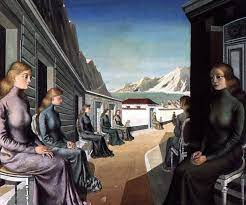
Ekphrasis, according to The Oxford Classical Dictionary, means “the rhetorical description of a work of art.” And Edward Hirsch, in his hefty resource, A Poet’s Glossary, quotes Paul Valéry as saying, “We should apologize that we dare to speak about painting” in one breath, and, “There are important reasons for not keeping silent [since] all the arts live by words. Each work of art demand its response” in another.
Now that Paul has cleared that up, we writers might consider what it would be like to labor on a painting only to have a writer “interpret” it via ekphrastic poetry. Would we take umbrage? Would we be flattered?
Me, I’d be happy to invite all comers with their various interpretations, but the thing about ekphrastic poetry is that it yields a spectrum of styles and results. Some poems can blatantly interpret, sometimes taking obvious liberties because they can, while others are more delicately descriptive, as if it’s a game of “close your eyes and listen, my child, seeing if my words can’t paint as well as the master.”
Best for both purposes are puzzling paintings like Paul Delvaux’s Village of the Mermaids, which led to Lisel Mueller’s poem “Paul Delvaux: The Village of the Mermaids.” Mueller’s poem asks (and implicitly creates) more questions than it states answers–for me, a valid purpose of ekphrastic poetry.
Mueller is our woman in Havana, so to speak, giving us a play-by-play of the curiosity she sees before her. Mermaids? These look like no mermaids Hans Christian Andersen (or, for that matter, Walt Disney) has ever conjured. They look like nuns. No. Like prostitutes, Mueller says. Such opposites are a graphic throwing out of the hands in confusion. They are also an invitation for the reader to find and scrutinize the painting as well. Which is it? And is the writer correct?
For Mueller, the lodestone of the painting is the man in black and in back. In stanza one, the words “The painter” come up right after this mystery man is mentioned, as if implying perhaps the painter himself is walking away. Or not, as wondered in stanza three, where the poet returns to the man in black, this time calling him the only “familiar figure” just after mentioning the date, 1942–a year sure to bring Hitler to mind. The man in black is “approaching the sea, / and he is small and walking away from us.”
“Small” could imply insignificant, unworthy, or helpless, all of which would send the poem in drastically different directions. What the poem gets right, and what serves the ekphrastic art perfectly, is how the poem echoes the painting’s mysterious nature. Mueller respects the painting by wondering while avoiding direct interpretations. Unless you, the reader, want to take the baton and finish the race yourself by interpreting Mueller’s poem and, by proxy, the painting, too.
But isn’t that what any museum patron can do, or should do, while staring at the original canvas? I think so, and therein lies a happy marriage of painting and writing, of art and art.
“Paul Delvaux: The Village of the Mermaids”
Oil on canvas, 1942
by Lisel Mueller
Who is that man in black, walking
away from us into the distance?
The painter, they say, took a long time
finding his vision of the world.
The mermaids, if that is what they are
under their full-length skirts,
sit facing each other
all down the street, more of an alley,
in front of their gray row houses.
They all look the same, like a fair-haired
order of nuns, or like prostitutes
with chaste, identical faces.
How calm they are, with their vacant eyes,
their hands in laps that betray nothing.
Only one has scales on her dusky dress.
It is 1942; it is Europe,
and nothing fits. The one familiar figure
is the man in black approaching the sea,
and he is small and walking away from us.




